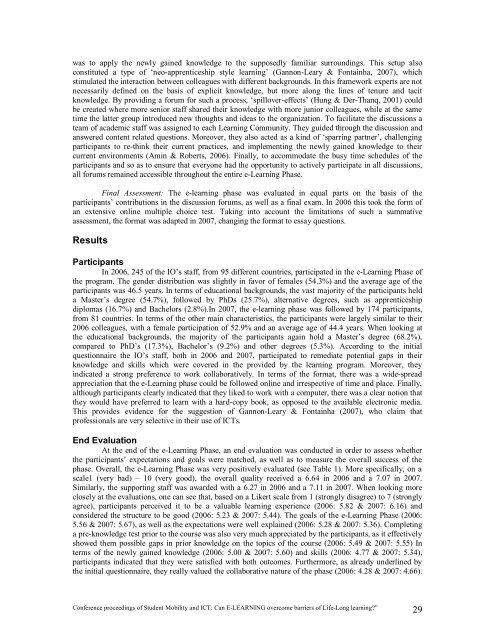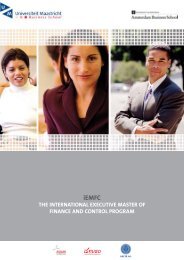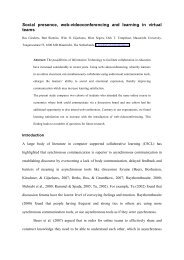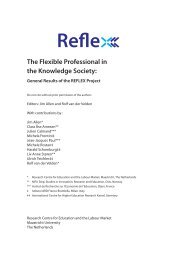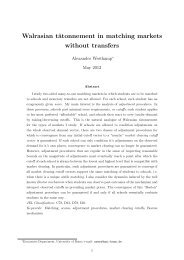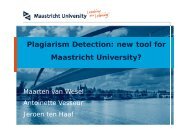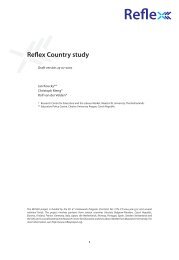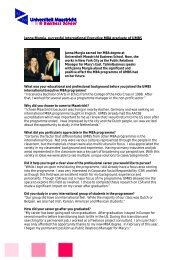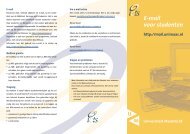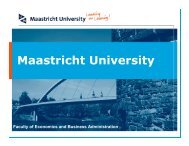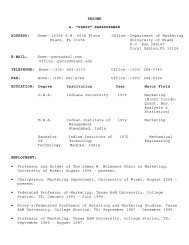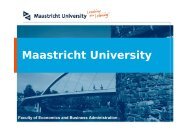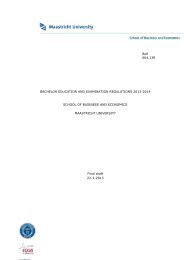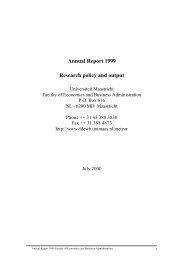proceedings of Student Mobility and ICT: Can E-LEARNING
proceedings of Student Mobility and ICT: Can E-LEARNING
proceedings of Student Mobility and ICT: Can E-LEARNING
You also want an ePaper? Increase the reach of your titles
YUMPU automatically turns print PDFs into web optimized ePapers that Google loves.
was to apply the newly gained knowledge to the supposedly familiar surroundings. This setup also<br />
constituted a type <strong>of</strong> ‘neo-apprenticeship style learning’ (Gannon-Leary & Fontainha, 2007), which<br />
stimulated the interaction between colleagues with different backgrounds. In this framework experts are not<br />
necessarily defined on the basis <strong>of</strong> explicit knowledge, but more along the lines <strong>of</strong> tenure <strong>and</strong> tacit<br />
knowledge. By providing a forum for such a process, ‘spillover-effects’ (Hung & Der-Thanq, 2001) could<br />
be created where more senior staff shared their knowledge with more junior colleagues, while at the same<br />
time the latter group introduced new thoughts <strong>and</strong> ideas to the organization. To facilitate the discussions a<br />
team <strong>of</strong> academic staff was assigned to each Learning Community. They guided through the discussion <strong>and</strong><br />
answered content related questions. Moreover, they also acted as a kind <strong>of</strong> ‘sparring partner’, challenging<br />
participants to re-think their current practices, <strong>and</strong> implementing the newly gained knowledge to their<br />
current environments (Amin & Roberts, 2006). Finally, to accommodate the busy time schedules <strong>of</strong> the<br />
participants <strong>and</strong> so as to ensure that everyone had the opportunity to actively participate in all discussions,<br />
all forums remained accessible throughout the entire e-Learning Phase.<br />
Final Assessment: The e-learning phase was evaluated in equal parts on the basis <strong>of</strong> the<br />
participants’ contributions in the discussion forums, as well as a final exam. In 2006 this took the form <strong>of</strong><br />
an extensive online multiple choice test. Taking into account the limitations <strong>of</strong> such a summative<br />
assessment, the format was adapted in 2007, changing the format to essay questions.<br />
Results<br />
Participants<br />
In 2006, 245 <strong>of</strong> the IO’s staff, from 95 different countries, participated in the e-Learning Phase <strong>of</strong><br />
the program. The gender distribution was slightly in favor <strong>of</strong> females (54.3%) <strong>and</strong> the average age <strong>of</strong> the<br />
participants was 46.5 years. In terms <strong>of</strong> educational backgrounds, the vast majority <strong>of</strong> the participants held<br />
a Master’s degree (54.7%), followed by PhDs (25.7%), alternative degrees, such as apprenticeship<br />
diplomas (16.7%) <strong>and</strong> Bachelors (2.8%).In 2007, the e-learning phase was followed by 174 participants,<br />
from 81 countries. In terms <strong>of</strong> the other main characteristics, the participants were largely similar to their<br />
2006 colleagues, with a female participation <strong>of</strong> 52.9% <strong>and</strong> an average age <strong>of</strong> 44.4 years. When looking at<br />
the educational backgrounds, the majority <strong>of</strong> the participants again hold a Master’s degree (68.2%),<br />
compared to PhD’s (17.3%), Bachelor’s (9.2%) <strong>and</strong> other degrees (5.3%). According to the initial<br />
questionnaire the IO’s staff, both in 2006 <strong>and</strong> 2007, participated to remediate potential gaps in their<br />
knowledge <strong>and</strong> skills which were covered in the provided by the learning program. Moreover, they<br />
indicated a strong preference to work collaboratively. In terms <strong>of</strong> the format, there was a wide-spread<br />
appreciation that the e-Learning phase could be followed online <strong>and</strong> irrespective <strong>of</strong> time <strong>and</strong> place. Finally,<br />
although participants clearly indicated that they liked to work with a computer, there was a clear notion that<br />
they would have preferred to learn with a hard-copy book, as opposed to the available electronic media.<br />
This provides evidence for the suggestion <strong>of</strong> Gannon-Leary & Fontainha (2007), who claim that<br />
pr<strong>of</strong>essionals are very selective in their use <strong>of</strong> <strong>ICT</strong>s.<br />
End Evaluation<br />
At the end <strong>of</strong> the e-Learning Phase, an end evaluation was conducted in order to assess whether<br />
the participants’ expectations <strong>and</strong> goals were matched, as well as to measure the overall success <strong>of</strong> the<br />
phase. Overall, the e-Learning Phase was very positively evaluated (see Table 1). More specifically, on a<br />
scale1 (very bad) – 10 (very good), the overall quality received a 6.64 in 2006 <strong>and</strong> a 7.07 in 2007.<br />
Similarly, the supporting staff was awarded with a 6.27 in 2006 <strong>and</strong> a 7.11 in 2007. When looking more<br />
closely at the evaluations, one can see that, based on a Likert scale from 1 (strongly disagree) to 7 (strongly<br />
agree), participants perceived it to be a valuable learning experience (2006: 5.82 & 2007: 6.16) <strong>and</strong><br />
considered the structure to be good (2006: 5.23 & 2007: 5.44). The goals <strong>of</strong> the e-Learning Phase (2006:<br />
5.56 & 2007: 5.67), as well as the expectations were well explained (2006: 5.28 & 2007: 5.36). Completing<br />
a pre-knowledge test prior to the course was also very much appreciated by the participants, as it effectively<br />
showed them possible gaps in prior knowledge on the topics <strong>of</strong> the course (2006: 5.49 & 2007: 5.55) In<br />
terms <strong>of</strong> the newly gained knowledge (2006: 5.00 & 2007: 5.60) <strong>and</strong> skills (2006: 4.77 & 2007: 5.34),<br />
participants indicated that they were satisfied with both outcomes. Furthermore, as already underlined by<br />
the initial questionnaire, they really valued the collaborative nature <strong>of</strong> the phase (2006: 4.28 & 2007: 4.66).<br />
Conference <strong>proceedings</strong> <strong>of</strong> <strong>Student</strong> <strong>Mobility</strong> <strong>and</strong> <strong>ICT</strong>: <strong>Can</strong> E-<strong>LEARNING</strong> overcome barriers <strong>of</strong> Life-Long learning?” 29


